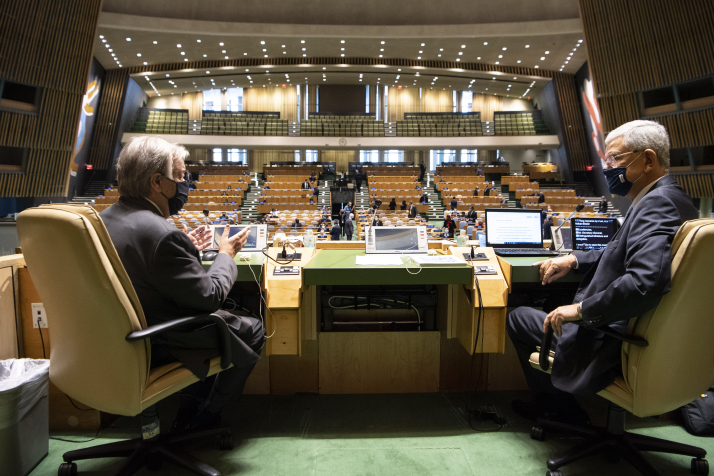| Voice |
| Global governance faces both challenges and opportunities | |
|
|
 The 15th Group of 20 Leaders' Summit sign is projected on the wall of a historical site in Riyadh, Saudi Arabia, on November 20 (XINHUA)
The world economy is in deep water as a result. According to International Monetary Fund (IMF) estimates in October, the global economy is expected to shrink by 4.4 percent in 2020, the worst recession since the 1930s. Despite a global recovery in the third quarter, it fell again, a double dip, due to new lockdowns. The Group of 20 (G20) comprises 20 of the world's largest economies. As it is a premier global economic governance platform, great hopes were placed on the 15th G20 Leaders' Summit convened virtually on November 21-22, that it would take the lead in lifting the world out of the public health and economic peril. Though the theme of the summit was "realizing opportunities of the 21st century for all," its focus was transferred to combating the pandemic, promoting the global economy and stabilizing people's livelihood. The leaders' declaration pledged to "value the efforts to safeguard people's health." It also proposed to "support all collaborative efforts, especially the Access to COVID-19 Tools Accelerator initiative and its COVAX facility" to cement global cooperation. The initiative is a global collaboration to accelerate the development, production and equitable access to COVID-19 diagnostics and vaccines. As for the stabilization of economy, the members are "determined to continue to use all available policy tools" to safeguard people's lives, jobs and incomes, and support the global economic recovery, while safeguarding against downside risks. Till now, $11 trillion has been spent by the G20 members to stimulate the economy. They are committed to the debt service suspension initiative, allowing 73 countries to suspend official debt payments. As of November 13, 46 countries had requested the suspension, amounting to an estimated $5.7 billion. In addition, the summit also reached agreements on upholding the authority of the UN and the multilateral trading system, increasing the sustainability and resilience of supply chains, and advancing international institutional reform. A worrying picture The summit was held despite multiple problems thanks to the efforts of the host country Saudi Arabia, which organized more than 160 online and offline multilateral conferences. But the group needs to do more to fulfill its designed role in coping with major global challenges to the full. Since COVID-19 is still spreading at a fast pace, the world economy's recovery is sluggish. More time is needed, maybe two to three years, to return to the pre-pandemic normal. The World Bank, the IMF and the World Trade Organization, with their limited fund and power, have been helpless in coordinating the international community in the fight against the pandemic. The World Health Organization (WHO), the most essential global organization to cope with the virus, is under attack from the U.S. administration under President Donald Trump. In July, Trump notified the UN of the United States' exit from WHO, which would be effective a year later. But President-elect Joe Biden has said the U.S. would re-join the organization on his first day in office. As one of the major multilateral mechanisms in the world, the G20 was established after the Asian financial crisis of 1997 to promote global growth. In the wake of the global financial crisis of 2008, it was elevated to include the leaders of member countries. The group, however, acted slowly in response to the pandemic, holding a video meeting only on March 26 after requests by China and France. Though action plans have been launched, their function is limited to emergencies, which is far from enough to prevent the spread of the virus and revive the world economy.  UN Secretary General António Guterres (left) talks with Volkan Bozkır, President of the 75th UN General Assembly, at the UN headquarters in New York City, the U.S., on September 21 (XINHUA)
Worse still, unilateralism and protectionism are on the rise and there is a lack of coordination in trade and economic policies. Trade frictions and technological battles are threatening stability. The current global governance system was established under the leadership of the U.S. with its super power, both hard and soft, and willingness to lead becoming an important basis for its functioning. But since the presidency of Trump, its leading role has waned. In November alone, the U.S. withdrew from the Paris Agreement on climate change and the Open Skies Treaty, which allows its 34 members to conduct short-notice unarmed reconnaissance flights over one another's territory to collect data on military forces and activities. A rapidly developing China has triggered resurgence of cold war and hegemonic rhetorics in the U.S., making it basically revise its engagement policy toward China. Competition and containment have once again become the core of the U.S. strategy. It is predicted that in the foreseeable future, the U.S. enthusiasm for multilateralism will drop further and it will allocate more resources to strategic competition. Biden might restrain the excessiveness after assuming office as the next president, but the momentum is hard to reverse. Globalization to endure The degeneration of the global system started as early as in 2000, and COVID-19 accelerated the process. But it is an opportunity as well. Since the world is one global village and single countries find it harder to tackle global challenges, the demand for global governance will only increase. It means even though the U.S. is reluctant to take responsibility anymore, refusing to provide public goods as it did, it is impossible for the world to retreat into isolation. The past years have seen globalization forge ahead and countries become connected as a community with shared benefits. Also, the rise of developing countries has brought a new energy. China's development has been achieved through peace and cooperation, which is different from the rise of the West that relied on expansion and colonization. But a stronger China will not pose a security threat to the U.S. or other countries. On the contrary, it will provide opportunities for common development. In November, Chinese President Xi Jinping participated in leaders' meetings of the Shanghai Cooperation Organization, BRICS, Asia-Pacific Economic Cooperation and the G20, emphasizing China's consistent position on multilateralism, opening up and win-win cooperation, and conveying the desire to build a community with a shared future. Global governance is at a critical crossroads in the transition between the old and new systems. But despite numerous challenges, the prospects are bright. On November 15, 15 Asia-Pacific economies signed the world's largest free trade agreement, the Regional Comprehensive Economic Partnership. In the new era, countries should forge synergy and promote global co-governance in the midst of challenges. The author is an associate researcher with the China Institutes of Contemporary International Relations (Print Edition Title: At a Crossroads) Copyedited by Sudeshna Sarkar Comments to yanwei@bjreview.com |
|
||||||||||||||||||||||||||||
|